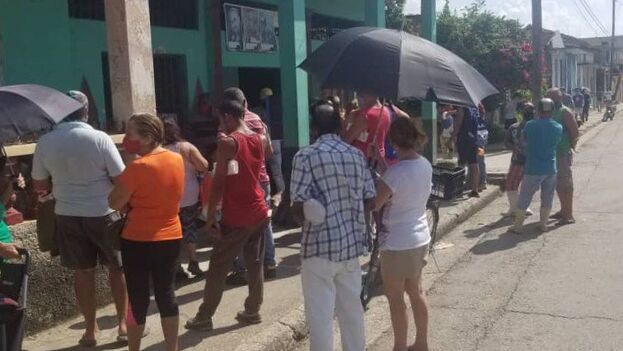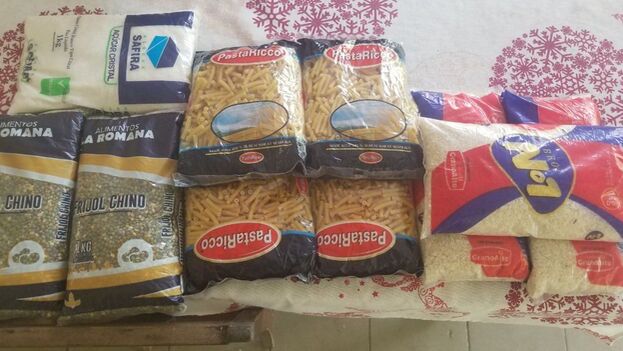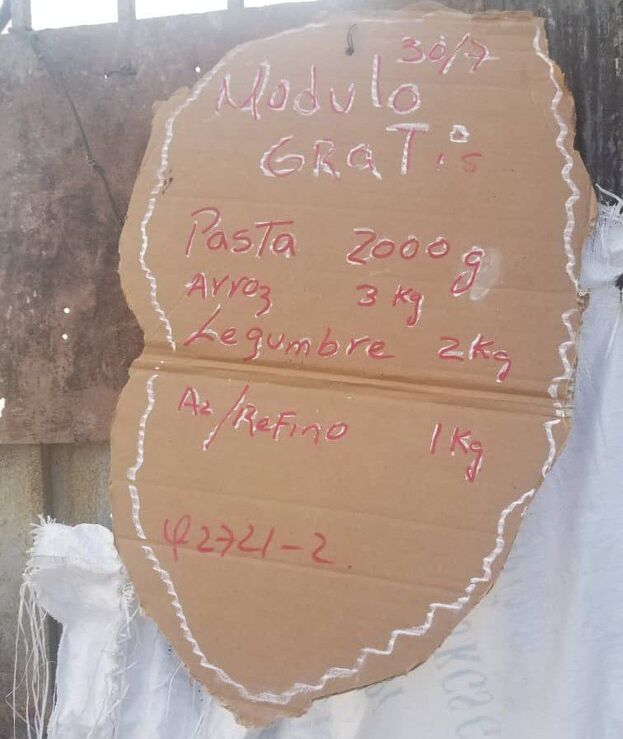
![]() 14ymedio, Natalia López Moya, Havana, 1 August 2021 — Since Friday, the line has not stopped outside the bodega (ration store) at 251st and 50th streets in Punta Brava, a Havana neighborhood of La Lisa. But unlike other times, customers only need their ration book and a bag, because the food module that is distributed is free.
14ymedio, Natalia López Moya, Havana, 1 August 2021 — Since Friday, the line has not stopped outside the bodega (ration store) at 251st and 50th streets in Punta Brava, a Havana neighborhood of La Lisa. But unlike other times, customers only need their ration book and a bag, because the food module that is distributed is free.
“People don’t believe it yet, that’s why half the town has come today, so they won’t regret it later and start charging us,” jokes Juan, one of the surprised residents in the vicinity of the premises who returned home with two bags of pasta, some sugar, two packages of peas and three of rice.
The products are part of a free distribution that the Cuban government has started in a hurry to try to calm things down after the popular protests on July 11. The first places where the distribution began on July 30 coincide with the neighborhoods of the capital where the demonstrations were most intense.
“Here the people rushed out into the street, and the people of Bauta, which is the nearby town, also joined to go from here to the center of Havana. There were many of us and we reached the checkpoint but they blocked us with a bus and several police cars to prevent us from leaving,” Yantiel, age 25, told 14ymedio.
“In Punta Brava there are still many young prisoners, whose mothers have not even been able to see them since that day they were arrested,” he laments. “Although there have not been other protests like that one, it has happened that the neighbors have stoned the houses of the thugs who hit the people that day.”

María Elena, 64, also believes that “none of this would be distributed, much less for free, if it were not for the fact that people took to the streets.” According to this worker in an industrial products store, “we are living very badly here, there is hardly any food to be found and our electricity is cut off all the time.”
The free module is “a patch to cover the gap,” she adds, but it does not solve the serious problems of a neighborhood with more than 140,000 inhabitants, very affected by mobility restrictions with the Cuban capital. “They want to shut us up with a little rice, but don’t forget that this area is called Punta Brava [Brave Point] and it is for a reason.”
The delivery has begun in Havana, the epicenter of the protests, and will spread to other provinces with high population densities and where the demonstrations were also very numerous, such as Matanzas, Ciego de Ávila, Santiago de Cuba, Holguín, Guantánamo and Isla de La Juventud, before reaching the entire country.
The information was expanded on Friday by the Minister of Internal Trade, Betsy Díaz Velázquez, on the Roundtable television program. The minister explained that it was decided to distribute these modules after a donation from Russia and “after learning about offers and donations from Mexico, Bolivia, Vietnam and other nations.”
“In this way, a delivery schedule has been set up. In parallel, to those who are not receiving this module in the first 15 days, other products that are arriving will be delivered and others that will be received will continue to be delivered so that there is a benefit.”
The authorities have also announced the sale of an additional three pounds of rice per consumer from August to December, an increase that the minister justified from the profits of the unpopular stores that take payment only in freely convertible currency (MLC). “The result of the sales in those stores, it was always said, is for the benefit of the people,” said Díaz.

In a few hours, the report of the official’s words, published by the official press, has generated hundreds of comments, many of them critical. Several commenters alluded to the limited variety and quantity of the module’s products. “Minister, is there no chance of an increase in coffee?” Asked a netizen who identified himself as Luma.
But an official from the Ministry of Internal Trade responded that coffee “is not one of the donation products,” a statement that sparked another barrage of complaints from customers who have seen the popular drink disappear from stores in Cuban pesos, to remain available for sale in foreign currency or at sky-high prices on the black market.
“They have not been able to do like other times they have sent donations and have ended up selling them,” adds another neighbor who was waiting in line this Friday to acquire his family’s module. Last April, several Internet users denounced on social networks the sale in the rationed market of vegetable oil donated to the Island by the United Nations World Food Program (WFP).
At that time, the criticisms rose so much in tone that the Ministry of Internal Commerce had to come up with a statement in which it assured that the product “will be replaced” when the breakdowns in the national industry were repaired, but this action has not been reported so far by the official press.

This was not the first time that this type of complaint came to light on the island. In 2017, after the onslaught of Hurricane Irma, numerous governments, non-governmental organizations and UN agencies sent donations to Cuba to alleviate the shortages in food, medicines, water and construction materials. Several victims then complained that they had to pay the state for mattresses, stoves and even charcoal.
In Punta Brava they feel they have won a little battle. “At least this time they are not going to get money from us for something that was donated for the people,” adds the neighbor. “But here we are still very upset with the situation and a little macaroni is not going to calm that down.”
____________
COLLABORATE WITH OUR WORK: The 14ymedio team is committed to practicing serious journalism that reflects Cuba’s reality in all its depth. Thank you for joining us on this long journey. We invite you to continue supporting us by becoming a member of 14ymedio now. Together we can continue transforming journalism in Cuba.
